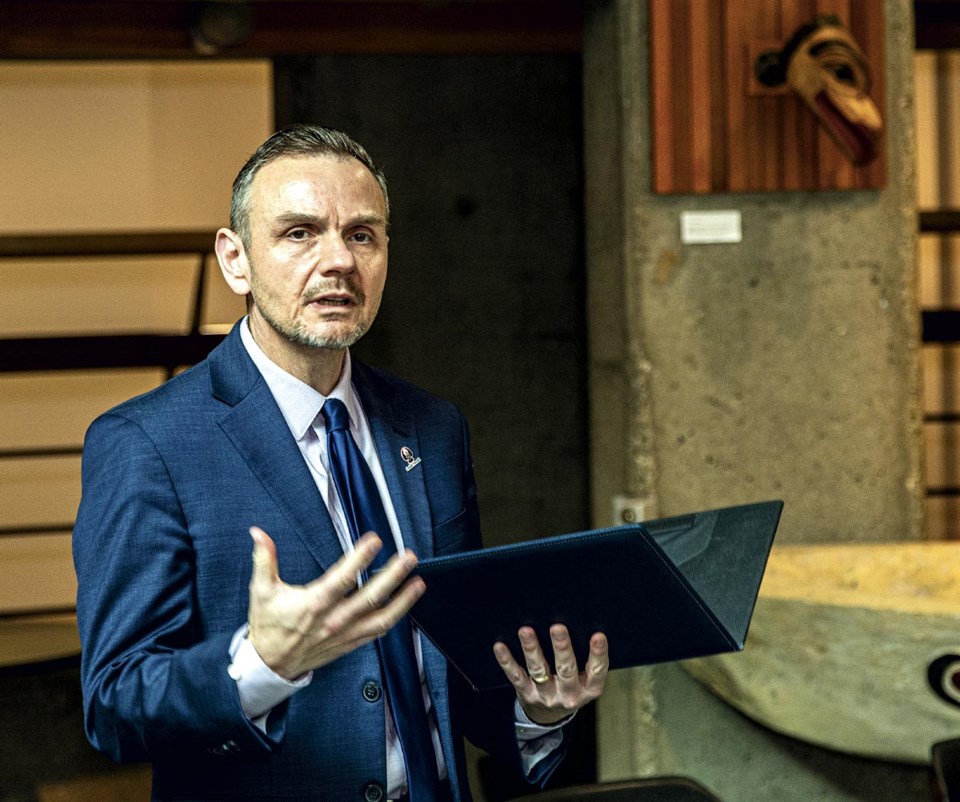The University of Northern British Columbia's president is stepping down before the official start of his second term.
Geoffrey Payne made the announcement at the Prince George campus on Thursday, June 19.
“Every moment that I've been a part of the UNBC community has been a pleasure,” Payne told The Citizen. “I came in as an assistant professor and had the opportunity to work with amazing people who mentored me and supported me. One of the things that's always impressed me about UNBC is the people."
He's leaving to take on a new role as president and CEO of Michael Smith Health Research BC.
“Although today I'm stepping down as the president of UNBC and moving on to this exciting opportunity, the university will continue to move forward," he said.
Michael Smith Health Research BC, established in 2001, is the province’s health research agency. According to its website, its goal is to attract, recruit and retain people with the professional skills needed to advance research, support the knowledge economy and improve the health of British Columbians.
The move marks the end of Payne’s tenure at UNBC, where he has served in a variety of leadership roles since joining the institution in 2004.
Payne served as vice-president of research, inaugural assistant dean for education and research with the Northern Medical Program and founding director of the UNBC Health Research Institute.
He has also led progress in several key areas, including advancing research, making meaningful strides on Truth and Reconciliation, improving the budget process, and developing and launching the university’s renewed strategic vision, Ready.
He was appointed interim president in 2020 and named UNBC’s sixth president in April 2022. He was reappointed in July 2024, with that term set to begin this June 28 and run until 2030.
In his interview with The Citizen, Payne said there are no immediate plans for a replacement but that he is confident in the transition process.
“We made the announcement early — with Michael Smith Health Research BC and here at UNBC — to give the board time to really think it through,” he said. “I'm not leaving tomorrow. There will be a significant transition over the next number of months, which gives us time to make intentional decisions and continue the momentum we've built.”
Payne described his new role as a rare opportunity to make a broader impact on health research in BC.
“Opportunities like this don’t come up often,” he said. “My background in research — and particularly health research — played a big part. I thought this would be a great opportunity to make a difference and contribute positively to that organization.”
Payne also offered advice for his successor.
“Remember the 16,000 people who started this institution,” he said. “Those hopes and aspirations for a community. Remember, it's the people. It’s the connectedness to the North. Those are the things that will always be part of UNBC. So regardless of who is next to sit in the president’s seat, remember those pieces — and that the green and gold runs deep.”
Payne said he has mixed emotions about the move and that UNBC will always hold a special place in his heart.
“It’s a lot to process today, for sure,” he said. “But I’m just thankful, humbled, honoured. It has been an absolute professional privilege to serve as president of UNBC. It’s been an honour to work with hundreds — thousands — of people over my 20 years here. The North will always be part of who I am, and UNBC has a permanent mark on my heart.”
Joel McKay, chair of the university’s board of governors, praised Payne’s impact, saying his leadership helped guide UNBC through the challenges of the COVID-19 pandemic and into a period of renewed focus and stability.
“His student-first approach and dedication to building diverse, empowered teams will ensure UNBC remains focused on delivering outstanding student experiences, advancing research and deepening our engagement with communities,” McKay said in a statement.
During Payne’s time as president, UNBC advanced priorities including academic and research excellence, Truth and Reconciliation, budget reform and the development of a new institutional vision, titled Ready.
The university stated it is beginning a search for Payne’s successor and is committed to a “transparent and deliberate” process. In the meantime, McKay said the institution’s leadership team is well-positioned to maintain momentum and stability during the transition.


